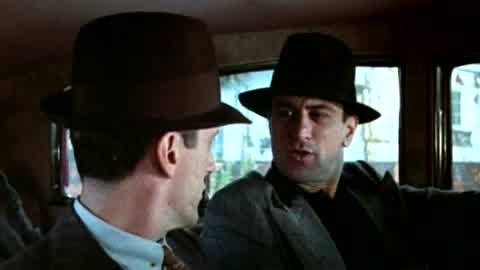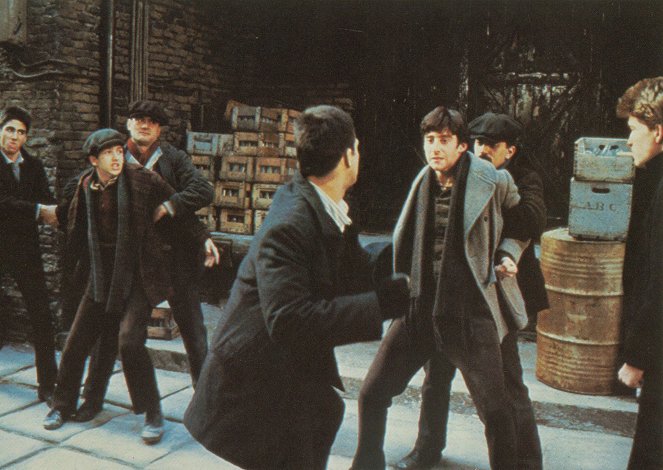Réalisation:
Sergio LeonePhotographie:
Tonino Delli ColliMusique:
Ennio MorriconeActeurs·trices:
Robert De Niro, James Woods, Elizabeth McGovern, Joe Pesci, Burt Young, Tuesday Weld, Treat Williams, Danny Aiello, Richard Bright, James Hayden (plus)VOD (4)
Résumés(1)
New York à la fin de la Prohibition. Recherché par le FBI à la suite d'une combine qui a mal tourné, David "Noodles" Aaronson se réfugie dans une fumerie d'opium. Il doit quitter la ville en catastrophe pour n'y revenir que trois décennies plus tard, en 1968, alors qu'une mystérieuse note le presse de se rendre sur la tombe de ses anciens amis. De retour dans le quartier juif de Brooklyn, Noodles rappelle à lui les souvenirs de sa jeunesse : son adolescence dans ces rues, les règlements de compte entre bandes, ses rendez-vous amoureux avec Deborah, et sa rencontre avec Max, le caïd qui l'entraîna peu à peu dans le crime... (Carlotta Films)
(plus)Vidéo (1)
Critiques (12)
Il était une fois en Amérique est un film à l'humeur morose et décousue, mais elle m'a quand même totalement captivé. Chaque fois que je me rappelle de la musique principale de Morricone, une sensation chaleureuse m'envahit et se joignent les visions de la silhouette grisonnante de Robert De Niro, de la magnifique jeune Jennifer Connelly et du gigantesque pont de Brooklyn. Il était une fois en Amérique est à la fois brut et doux, mais surtout un film magnifiquement poétique qui se décomposera lentement dans vos pensées et gagnera en importance chaque jour.
()
A drawn-out macho mafia saga that gets old as the characters become sparser and the dialogue becomes shallower. There are flashes of Leone's brilliance, of course, but the film is generally similar to Morricone's music. It's quite impressive, but too familiar; the Pan almost kills even the phenomenal Picnic at Hanging Rock. It turns this festival of plaintive glances by human exclamation marks into a nostalgic museum exhibit of a film world that fortunately belongs to yesterday.
()
I would love to write about this dream project of Sergio Leone, to which he devoted many years of his life, that I was so absorbed at the beginning and at the end I didn't want to go back to reality. Unfortunately, I can only say that about the first half, especially the period of Noodles's childhood, which was beautifully and sensitively filmed. The rest, however... First of all, the fact that Leone’s dream epic doesn't bore at all and doesn't feel draggy despite its nearly four-hour runtime is only due to his directorial mastery. Unfortunately, it falters a bit on the screenwriting front. It's as if Leone took too big a bite, or as betelgeuse rightly points out here, as if he had made a series, but lost a few episodes and artfully glued the rest together. Some of the characters are underdeveloped, and at times it's hard to trust the motives behind their actions. For example, the character of Joe Pesci, promisingly sharp, there’s a shot of him by a hospital elevator as if the director was suggesting "Watch out, he's still here!", but suddenly he disappears somewhere and incomprehensibly does not appear in the film anymore. I didn't believe James Woods for a second at the very end, nor did I believe his intended action, and I found the whole point about him quite implausible. However, what must definitely be appreciated is the absolutely precise, to the smallest detail elaborate design, the visual depiction of three different stages of the 20th century. Leone's perfectionism went so far that even for one short shot he was willing to "coach" hundreds of extras, believably period-styled and moving in a perfect set. Even the aged De Niro looked excellent, though perhaps it’s a little puzzling that the filmmakers did not bother too much with the character of Deborah, whose 35-year difference was not noticeable and as an almost 60-year-old woman she still looked like a 20-year-old girl. All in all, I am satisfied, but I can safely say that Once Upon a Time in the West remains unsurpassed.
()
I could bend over backward, and I still probably wouldn't find any mistakes in Once Upon a Time in America. For almost four hours, Sergio Leone tells us what it means to have a friendship beyond the grave. With an almost unhealthy precision, it closely observes the three-generational clash of men who had no other choice but to do what they did since their youth. Building an empire with all its pleasures and problems. Love, hate, virtue, mistakes, and that friendship... All this in a mesmerizing audiovisual setting. Hypnotic music by Ennio Morricone with a beautifully catchy melody. Long and slow camera "walks." A brilliant shot focuses on a street where a group of boys is crossing, with the iconic Brooklyn Bridge towering in the background, nestled between two buildings. Perfection. Which time period is the best? That's a tough question. Youth, with all its worries, abounds with that childlike look of boys whom the street has forced to grow up all too soon. The central and longest part depicts their built empire during its peak prosperity until the final stage, where the inevitable reckoning of their past actions takes center stage. Leone transitions between these periods subtly and unobtrusively, but always the contrast of period diversity is incredibly beautiful. I have a warm feeling in my heart that I sacrificed four hours for something so spectacular and hard to describe. Master, from the bottom of my heart, thank you...
()
There are some pictures for which even the maximum number of stars is too constricting. And Leone’s most personal work is just that type of movie. But it is hard to give it an adequate rating since even the four-hour version eventually released years later is still too short to be able to reveal all of the storylines that Sergio Leone had filmed. The result is that we are left with a lot of begun, but unfinished storylines (Frankie Joe, Pesci and Fat Moe, to name just a few). They should release the originally intended six-hour version. This way we are left with incredibly strong historical frescos that Leone guides extremely sensitively through three time periods, supported by Morricone’s music, superb actors, amazing technical effects and outstanding production design. The best part of this picture is the first third. This is where Leone’s storytelling is at its best and I dare say that this part is the very best thing that Leone created (the word “filmed" simply isn’t enough in this case) during his long career.
()



Annonces